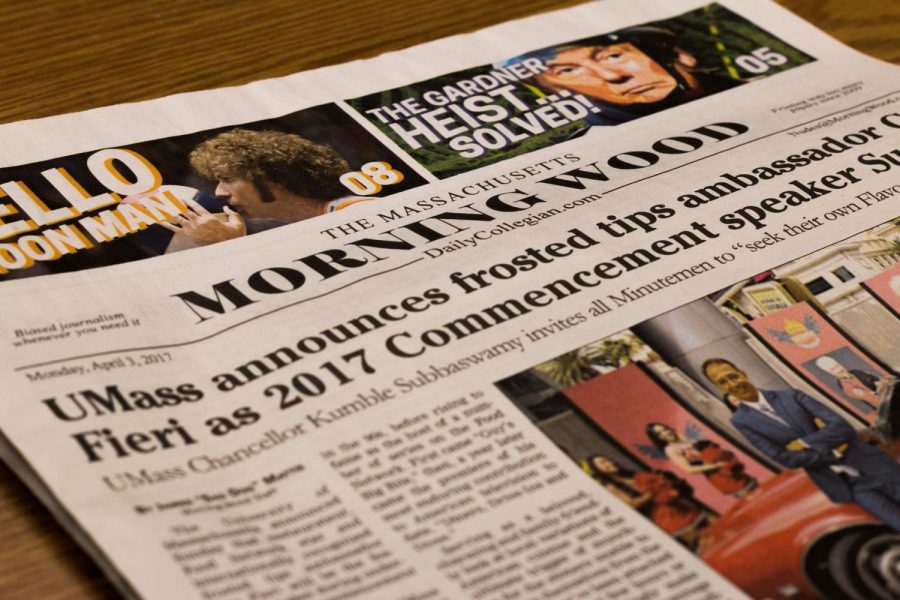The year is 2018, and John Oliver, a British comedian, is arguably the most influential investigative journalist in the country. Satirical news coverage born from Comedy Central has taken over American politics. Ask any University of Massachusetts student about the National Rifle Association, the coal industry or gerrymandering, and their response will likely be informed by Oliver’s coverage—either because they watched his show or because their friends did.
This is why it’s so important that The Massachusetts Daily Collegian continues to publish the annual, satirical Morning Wood special edition every April 1. Satire is one of journalism’s best tools to hold the powerful in check and mock their bad behavior publicly. Good satire isn’t always political, but even when it isn’t, it should convey a strong message. Morning Wood rarely lets us down, and that’s why our readers love the edition. Collegian staff plan their columns meticulously, sometimes finishing their pieces weeks ahead of deadline.
In the years since Jon Stewart and Stephen Colbert brought political satire to a mass audience, the industry has exploded. Late night comedians on broadcast networks are recreating Stewart’s shtick, so much so that CBS cut out the middle man and hired Colbert to replace David Letterman in 2014. American viewers have spoken—the political satire of Colbert and Seth Myers is in, and the culture and entertainment satire of Jay Leno and Letterman is out.
When you wake up to Morning Wood this year on April Fool’s Day, think about why the author wrote the piece they did and what they really want you to take away as a reader. You’ll find a new level of appreciation for the humor, as long as the authors do their part.
However, bad satire can have consequences, especially in the era of fake news. A surprising number of your grandparents will share articles on Facebook this year about topics as fake as Pizzagate or worse.
As a result, satirical content must be published responsibly and should avoid damaging sensitive stereotypes. A recent study completed at the University of Dartmouth revealed that “[fake news] consumption was disproportionately observed among Trump supporters for whom its largely pro-Trump content was attitude-consistent,” and the study also concluded that as many as one in four Americans visited a fake news website between Oct. 7 And Nov. 14 of 2016, with older Americans being significantly more likely to be fooled.
English author Terry Pratchett wrote, “Satire is meant to ridicule power. If you are laughing at people who are hurting, it’s not satire, it’s bullying.” If your satire is attitude-consistent with the major fake news demographic or, in other words, attacks minority groups, women or immigrants, you are basically doing the work of sites like Breitbart and demeaning the value of good satire. Worse, people may act on your words, or at least be influenced by them politically.
It is the responsibility of any good satirist to mock those in power, or to at least subvert problematic cultural hegemony. Politicians aren’t the only Americans with power. Writers should consider celebrities, the wealthy, athletes and well-known members of our community as potential fair game. No harm will come from making fun of Donald Trump or Bernie Sanders, but a tasteless commentary about international students isn’t excused through the veneer of satire.
Finally, remember that good satirists respect their audiences. For nine years, Colbert stayed in character for every episode of “The Colbert Report” and used imagery and language to let his audience in on the joke. If the author has to give away the game, then they’ve failed in delivering a good satirical message. And that begs the question, should the Collegian slip Morning Wood stories in with regular news coverage during the year? I’m all for it.
William Keve is a Collegian columnist and can be reached at [email protected].



















Question Me not, Malachi • Mar 20, 2018 at 12:08 pm
“Morning Wood rarely lets us down”
“When you wake up to Morning Wood this year on April Fool’s Day,”
Nice.
Ron • Mar 21, 2018 at 2:26 am
Sure looking forward to that piece.
Sitting Bull • Mar 20, 2018 at 10:26 am
Satire is essential. Unfortunately, those currently practicing it are quite terrible. I can’t find a funny bone between Trevor Noah, Samantha Bee, Seth Meyers. Colbert is moderately funny, but seeing him every night reveals his significant comic limitations. His Anti-Trump stuff is to the point of one trick-pony. It’s repetitive and not delivered in a sufficiently humorous manner. Trevor Noah is lucky he’s foreign and black – otherwise there is no justification for him being on television. Samantha Bee is less funny than a cruise ship comic. Seth Meyers just got moved up from the JV squad because he’s Lorne’s boy. Satire is important, but so is comic timing, delivery, and variety of topic. The utter saturation of the mainstream satirists has become tiresome.
Ron • Mar 21, 2018 at 2:24 am
I hate to say it, but your review’s attempts at humor reveal that you are no judge of it.